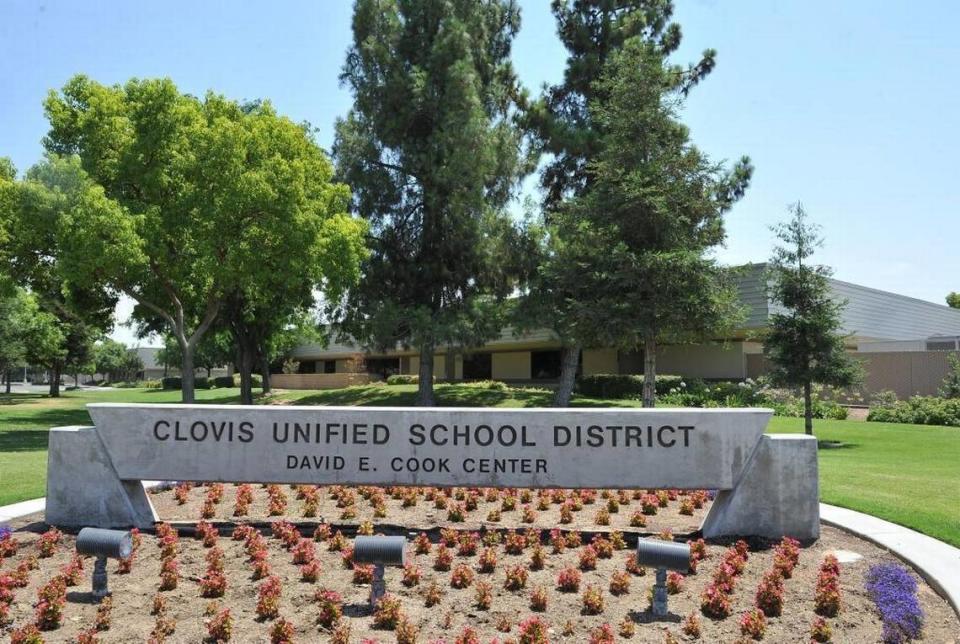Clovis wants parental consent for LGBTQ+ students to change gender identity at school
After community members called on the Clovis school board to establish a parental notification form earlier this month for student requests to change their name, pronouns or gender identity at school, a district representative would not say if the district was considering such a policy.
Turns out, Clovis Unified School District already has a de facto process that LGBTQ+ advocates say is forcing students who want their pronouns changed to come out to their parents or guardians.
Multiple sources, including Clovis Unified parents and school psychologists, confirmed the district already uses a form, the Student Site Plan (SSP), that requires consent from a parent or guardian before acknowledging a student’s preferred identity, and a student cannot complete the form without parental notification.
At the Sept 20 school board meeting, 87 people signed up to speak during the public comment section. For almost three hours, they voiced their concerns and anxieties about parental rights, students’ safety, and children’s right to privacy.
During the comments, LGBTQ+ community advocates accused the district of forcing or assisting students to come out to their parents through the SSP, and implementing the form without discussing or voting on it during a public meeting or announcing it.
Because neither the SSP or the consideration of a parental notification notice were part of the agenda, board members couldn’t address the matter directly.
Yet, at the conclusion of the late-night public comments period, Superintendent Corrine Folmer asked the district’s general counsel Maiya Yang to provide public clarification on what’s going on within the court systems and legal challenges at other school districts.
Across the state of California, several school districts are facing federal or state lawsuits to either protect LGBTQ+ students’ privacy or have districts tell parents when a child changes their preferred name, pronouns and gender identity at school.
“As we look across the state, and I work with our outside counsel, we see an area of the law that is developing and evolving,” Yang said. “It is not an area of the law that is well established.”
Yang anticipates that it will take years for the federal and state court systems to provide guidance and clarification on how to handle situations, she said, where “the rights of parents and the rights of students conflict.”
“Unfortunately, for school districts like us that are trying to navigate this very important issue, we don’t have a lot of guidance to go on,” Yang said.

The Bee asked Clovis Unified specific questions about when the SSP form started to be used, how a student goes about requesting the form, who fills out the form with students, and actions that could result in cases where there is parental consent or a principal is involved when safety is a concern.
Kelly Avants, the district’s spokesperson, did not answer questions individually but provided a general statement via email. Avants said the SSP is a document that is used individually on an as-needed basis with students and is the only document of its kind in use in the district today. She said The Bee’s questions were “dependent on the unique and individualized needs of a student” and didn’t think it would be appropriate to respond in a theoretical context.
Clovis Unified psychologists said the district started using the SSP form in March, and said it was implemented without public or staff consultation. The Bee reviewed Clovis Unified’s meeting agendas since January 2023 and did not find mention of or vote on the implementation of the Student Site Plan.
This form replaced the Gender Acknowledgment Plan (GAP) form, psychologists said, which was implemented in 2022 and did not require parental consent. Both forms, now the SSP and formerly the GAP, determine how a child participates in athletics and the use of facilities like changing rooms, bathrooms and lockers.
In the GAP form, students decided if they wanted their parents to be involved in their request for their preferred gender identity to be recognized at school. School psychologists said part of their GAP form-filling process included asking students how they felt about involving their parents and acknowledging the importance of parental involvement. They estimated that 85% of their in-person meetings involved supportive parents.
However, if a student expressed their gender identity wouldn’t be accepted at home, psychologists said they’d proceed with the remaining 15% of cases as the student wished. They talked about risk scenarios that could happen, such as someone calling their preferred name in front of non-supportive parents and being seen using facilities according to their gender identity by others, so students could assess how they would navigate uncomfortable and challenging situations.
Avants said Clovis Unified’s existing practices are centered on balancing the rights of students to access facilities and programs based on their gender identity and the rights held by parents and guardians in the upbringing of their children.
“We look at every child individually to make sure they are supported and safe at school,” she said. “And, we look for ways to ensure that no parent is left without access to their child’s student records and educational experience.”
Clovis Unified’s board of trustees meets on a biweekly basis on Wednesday evenings at 1680 David E . Cook Way. The public session of their meetings begins at 6: 30 p.m., and a few meetings remain this calendar year: Oct. 4, Oct. 18, Nov. 8 and a special Friday meeting on Dec. 8. You can find more information at cusd.com/BoardAgendas.aspx.

